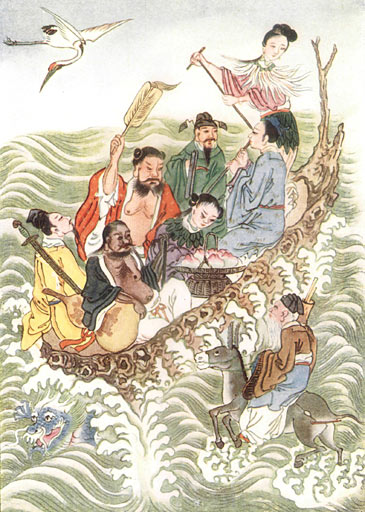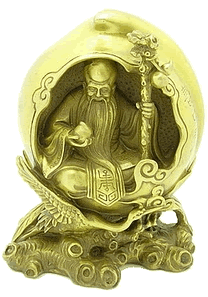The Peaches of Immortality
Queen
Mother of the West
|
The Peaches of Immortality
Queen
Mother of the West
|
Peaches of Immortality
Queen Mother of the
West (Daoist Goddess: Xi Wangmu, Hsi Wang-Mu)
Saint Shou (Longevity)
Bibliography Links
Quotations
Illustrations
The Peaches of Immortality
are Ripening
The
Queen Mother of the West Sits on High.
“Nobody knows Her beginning, nobody knows Her end.”
"Domestic wall-hanging embroidered with the image of Hsi-wang-mu,
the Queen Mother of the West, with phoenix and offering dish, and
three bats (fu)
pun symbol for happiness. The Eight Immortals appear
at the sides.
Late nineteenth century, Ch'ing Dynasty. 110" x 59''."
Looks to me like She is carrying four peaches on the offering dish.
- Tao: The Eastern Philosophy of Time and Change
This happy saint of longevity, Shou, holds the
Sacred Peach,
a dragon staff, and a gourd filled
with a Longevity Elixir. Flying around him are
bats, and a crane at his feet, both symbols of
longevity and/or immortality. The long white
beard and long ears of this old man are also
frequent symbols of wisdom and longevity.

The Eight Immortals on a Journey
The Peaches of Immortality must be carried to the Banquet

The saint of longevity, Shou, sits inside
the Sacred Peach. In his hands he holds
a sacred peach and a dragon staff.
![]()
Bibliography, Links, Resources
Search Google:
Immortal Peaches,
Tao: The Eastern Philosophy of Time and Change. By Philip Rawson and
Laszlo Legeza. London, Avon Books, 1973. 196 illustrations, 33 in
color.
Vision in the Midst of
Difficulty
![]()
Quotations, Notes, Information
"In China, the peach was said to be consumed by the immortals due to its mystic virtue of conferring longevity on all who ate them. The divinity Yu Huang, also called the Jade Emperor, and his mother called Xi Wangmu also known as Queen Mother of the West, ensured the gods' everlasting existence by feeding them the peaches of immortality. The immortals residing in the palace of Xi Wangmu were said to celebrate an extravagant banquet called the Pantao Hui or "The Feast of Peaches". The immortals waited six thousand years before gathering for this magnificent feast; the peach tree put forth leaves once every thousand years and it required another three thousand years for the fruit to ripen. Ivory statues depicting Xi Wangmu's attendants often held three peaches. The peach often plays an important part in Chinese tradition and is symbolic of long life. One example is in the peach-gathering story of Zhang Daoling, who many say is the true founder of Taoism. Elder Zhang Guo, one of the Chinese Eight Immortals, is often depicted carrying a Peach of Immortality." - Wikipedia
"The winds of Fall are gusting as we tip toward the
preponderance of Darkness. In the Chinese Concordance,* Autumn is the season of
the West, the Tiger, and Metal, all aligned with Xi Wang Mu (which can be
translated as the Western Grandmother or Queen Mother of the West). Its
designated organs are the lungs—called the Great Yin, another title of this
goddess--and the large intestine. Its sound is sighing, and it correlates, on
the negative side, with the emotions of sadness and grief. (Grief has its place,
and its sacredness, but it’s not an enjoyable feeling.) The dying back of herbs
is part of this connection, and watching things pass away."
- Vision in
the Midst of Difficulty
“Peaches of
immortality”, sometimes called “longevity peaches” are served at the birthday
dinner. Those names come from Taoist mythology that tells us
that the Emperor Jade provided them for the Queen Mother of the West on her
birthday. They came from a magical peach tree in the royal
orchard of heaven. That tree produced fruit every 1000 years
and granted immortality to those who ate the fruit. The
longevity peach is therefore a very special treat for it gives you the hope of
living 1000 years.
It is interesting to note that the peaches are
not real. They are steamed buns with sweet fillings such as
lotus paste. They’re called peaches as they’re made in that
shape."
-
Birthdays in China
“Nobody knows her beginning, nobody knows her end.”
- Zhuang Ze
"Since antiquity, the peach has been associated with longevity,
the "flat" peach especially with immortality. It is said the Queen Mother of the
West planted an orchard of "flat" peaches, taking 3,000 years to bear fruit.
Eating one was said to ensure immortality. On the Queen Mother's birthday,
immortals are invited to the orchard for the "Flat Peach Assembly". In
Journey to the West, the Monkey King Sun Wu-k'ung was ennobled by the Jade
Emperor as "Great Sage Equal of Heaven". Chapter 5 tells how the Monkey King got
angry and caused "a ruckus in the Halls of the Heavens". This was because the
Queen Mother did not invite him to her Flat Peach Banquet. Angry, he stole the
peaches and wine of immortality as well as the Golden Elixir before returning to
Flower Fruit Mountain. The Jade Emperor ordered the heavenly generals to capture
him, but they were all defeated. Furthermore, Sandy, originally the Rolled
Blinds General, broke the jade-glass cup at the Banquet and was banished to the
mortal world, haunting the River of Shifting Sands before joining Tripitaka and
disciples in their quest for the scriptures."
-
Fantastic Realms
Peach Assembly of Immortals
Ch'iu Ying (ca. 1494-1552), Ming Dynasty
"The Queen Mother of the West (Xi
Wang Mu 西王母) is the most important and most
prominent Daoist goddess. She rules over the Western mountain paradise of Kunlun
崑崙.. According to one version of the legend, the Queen Mother oversees the
orchards where the peaches of immortality grow. These come to fruition every
3,600 years, at which time she holds a banquet where guests may partake in the
peaches that confer or confirm immortality. She is thus often depicted as
holding court near the orchard and surrounded by a female retinue. Sometimes she
is identified as the mother of the Jade Emperor, while at other times she is
understood as his wife. In a contemporary context, the Queen Mother of the West
is also associated with Yaochi jinmu 瑤池金母 (Gold Mother of the Turquoise Pond),
who is popularly known as Laomu 老母 (Venerable Mother). In terms of iconography,
she often wears her distinctive headdress on which the peaches of immortality
are suspended."
- Daoist Center -
Personages
"The God of Longevity or Sau, is probably the most popular deity out of the three star Gods Fuk Luk Sau. He represents good health, longevity and a quality and smooth life. He is depicted carrying the Peach of Immortality, itself an auspicious symbol for long life and excellent health. The God of Longevity is also seen carrying a Dragon staff with a Wu Lou. The Wu Lou is believed to be filled with nectar of immortality. Many cultures have stories about a magic elixir or a fruit, the drinking or eating of which can reverse aging and grant eternal life to the partaker. Xi Wang Mu, the Queen Mother of the West in ancient Chinese mythology, lives far to the west (from ancient Chinese capitals in the east), high in the mountains, in a hidden garden where she grows peaches that give eternal life. Although the exact location of Xi Wang Mu's sanctuary/fortress is unknown, I think it is somewhere in the mountains ringing the Tarim Basin where there was west-east contact more than 4,500 years ago. Xi Wang Mu predates Daoist thought (under which she became 'civilized') and was originally a fierce tiger-goddess, a creator and destroyer of life. In that way, she resembles many other original goddesses whose origins reach back in the mists of time, long before writing, long before "history" as we think of it today."
"The Shou star (壽)
is Argo
Navis-α (Canopus),
the star of the South Pole in Chinese astronomy, and is believed to control the
life spans of mortals. According to legend, he was carried in his mother's womb
for ten year before being born, and was already an old man when delivered. He is
recognized by his high, domed forehead and the peach which he carries as a
symbol of
immortality. The God of Longevity is usually shown smiling and friendly, and
he may sometimes be carrying a gourd filled with Elixer of Life. Fu
Lu Shou (simplified Chinese:
福禄寿; traditional Chinese:
福祿壽; pinyin:
Fú Lù Shòu) refers to the concept of Good Fortune (Fu), Prosperity
(Lu), and Longevity (Shou). This
Taoist concept is thought to date back to the
Ming
Dynasty[1],
when the Fu Star, Lu Star and Shou Star were considered to be personified
deities of these attributes respectively. The term is commonly used in Chinese
culture to denote the three attributes of a good life."
- Fu Lu Shou -
Wikipedia
"Peaches, a female genital symbol, in China regarded as the source of the ambrosia of life which game gods their immortality; corresponding to the apple in western Europe. Great Mother Hsi Wang Mu ruled the magic peach garden in the west, where the gods were reborn. 'Peach Blossom' meant a virgin in Taoist symbolism, while the fruit stood for a mature woman whose juices were essential to men's health. China's patron saint of longevity Shou Lou was an old man with a high bulging forehead, bursting with "yhin juice." He had absorbed and sent up to his head through sexual coupling with many woman. To reveal his mystical secret, Shou Lou always held up a peach with one of his fingers stuck into its cleft. Chinese wizards made magic wands from peach twigs. These might be compared to magic wands made in the west from other woods sacred to the Goddess, such as witch hazel, witch-willow, apple boughs, or holly. Western writers sometimes confused the Oriental peach with the apricot, because abricot was once a European word for the vulva. Sculptures from the pagan period at Nimes showed examples of this fruit in conjunction with phalli. (Barbara Walker's The Woman's Encyclopedia of Myths and Secrets)."
![]()
First posted on the Internet on February 1, 2010.
This webpage was last modified or updated on November 1, 2013.